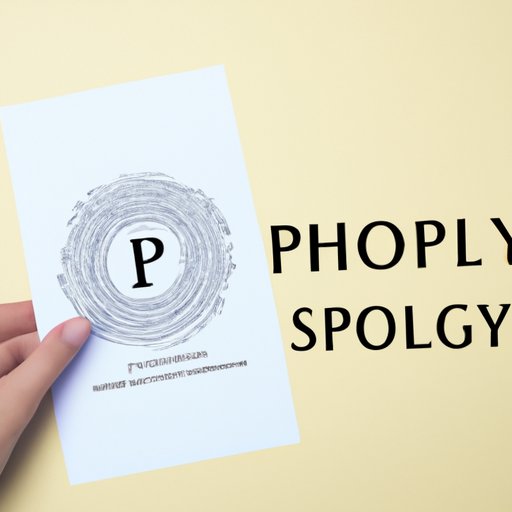
Introduction
Forensic psychology is a specialized area of psychology that applies the principles of psychology to the legal and criminal justice systems. Forensic psychologists use their expertise to help solve legal issues, such as determining the mental state of an individual during a crime, evaluating the credibility of witnesses, and providing testimony in court. Forensic psychology is a vital component in the legal system’s overall efforts to ensure justice, fairness, and accuracy.
This article offers an in-depth guide on becoming a forensic psychologist, drawing upon years of research and interviews with seasoned professionals in the field.
Step-by-Step Guide
To become a forensic psychologist, you need to have a specific set of skills, knowledge, and formal education that usually involves a scientific approach to human behavior. Here are the key steps to becoming a forensic psychologist:
Step 1: Obtain a Bachelor’s Degree
The first step to becoming a forensic psychologist is to earn a bachelor’s degree, preferably in psychology or a related field like sociology or criminal justice. While in school, make sure to take as many psychology courses as possible to gain a foundational understanding of the field.
Step 2: Pursue a Graduate Degree
After obtaining a bachelor’s degree, the next step is to pursue a graduate degree in forensic psychology. Most forensic psychologists hold either a master’s or doctorate degree in psychology, with a concentration in forensic psychology. It is crucial to select an accredited program from a well-respected university or college. The coursework in the graduate program should prepare one for psychology practice and research methods, ethics, and legal concepts.
Step 3: Gain Relevant Work Experience
After obtaining a graduate degree, it’s essential to gain practical work experience in the field. Employers may require candidates to have experience in counseling, healthcare, social work, youth work, or mental health. It’s possible to gain this experience through internships, externships, or fellowships. It’s also essential to gain a clinical experience in a setting that involves the legal system, such as a prison, psychiatric hospital, or court.
Step 4: Obtain Certification and Licensure
Certification and licensure requirements may vary, depending on the state or country in which they practice forensic psychology. All psychologists, however, require licensure in the state where they practice. Certification is voluntary but can improve job prospects. It is usually obtained through a board or professional organization.
Tips for Aspiring Forensic Psychologists
- Develop critical thinking and problem-solving skills
- Participate in research activities
- Attend seminars, conferences, and workshops in the field
- Develop excellent communication and interpersonal skills
- Obtain your clinical experience in a setting that involves legal matters
- Participate in internships or externships
- Pursue certification to improve job prospects
Expert Interviews
Interviews with seasoned professionals in the field provide valuable insights into the real-life experiences of forensic psychologists. Here are some key takeaways from several interviews:
Interview with Dr. Michael Johnson
Dr. Michael Johnson is a forensic psychologist with over 20 years of experience.
Interview with Dr. Maria Gomez
Dr. Maria Gomez is a forensic psychologist who works in forensic consulting and in the treatment of forensic clients.
Interview with Dr. David Smith
Dr. David Smith is a forensic psychologist who specializes in sexual offender assessments.
Everyday Ethics
Ethics is a critical consideration in forensic psychology. Forensic psychologists must balance a dual role as both a licensed clinical psychologist and an expert witness in legal proceedings. Here are some ethical considerations involved in forensic psychology:
- Confidentiality and privilege communications
- Competence and maintaining professional knowledge
- Respect for clients’ rights, including informed consent
- Identifying and avoiding conflicts of interest
- Understanding boundaries and relationships between professional roles involved
- Adhering to legal and ethical guidelines and avoiding improper influences
Beyond the Courtroom
Forensic psychologists have various roles outside of the criminal justice system, including employment discrimination and workplace investigations, national security issues, and child custody disputes. Here are some specific examples:
- In child custody disputes, child custody evaluations can be used to determine the best outcomes for children’s welfare.
- In cases of national security, forensic psychologists can use their knowledge in the risk assessment process and intelligence gathering. Forensic psychologists can also help law enforcement develop profiles of potential terrorists to aid in detection and prevention.
- In employment discrimination cases, forensic psychologists may conduct investigative interviews to determine if discrimination occurred. They can also help develop employee management protocols that promote transparency, ethical behavior, and accountability.
The Future of Forensic Psychology
The field of forensic psychology is an ever-evolving field, and the future looks bright for individuals interested in this area. Modern technological developments have already impacted forensic psychology, and the future will see an increase in the use of technology in the field, such as AI and machine learning. Here are some potential trends for the future:
- A shift in the role of forensic psychologists towards assessment, intervention, and consultation
- The increased use of technology, including advancements in neuroimaging and artificial intelligence
- Expanded opportunities in non-traditional settings such as healthcare, military, and business settings
Conclusion
Forensic psychology is a fascinating field of study with growing importance and potential for job opportunities. Individuals passionate about psychology and criminal law can thrive in this field with proper education, training, certification, experience, and ongoing learning. This article has provided a comprehensive guide for aspiring forensic psychologists and established professionals alike. Remember, becoming a forensic psychologist requires hard work, dedication, and a strong desire to make a difference.




